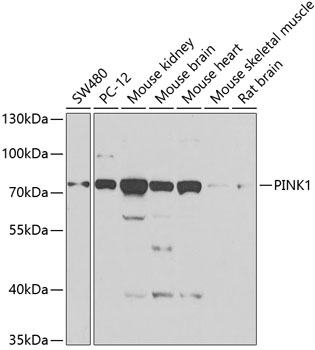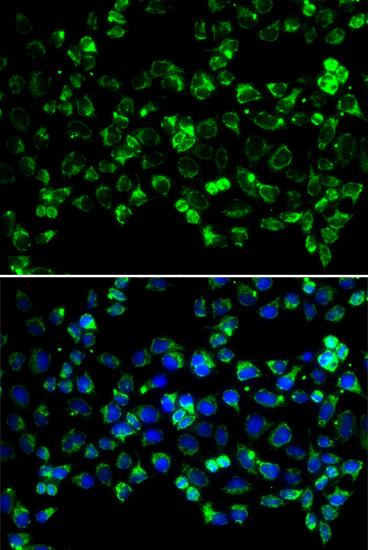-
Product Name
PINK1 Polyclonal Antibody
- Documents
-
Description
Polyclonal antibody to PINK1
-
Tested applications
WB, IHC, IF
-
Species reactivity
Human, Mouse, Rat
-
Alternative names
PINK1 antibody; BRPK antibody; PARK6 antibody; PTEN induced putative kinase 1 antibody
-
Isotype
Rabbit IgG
-
Preparation
Antigen: Recombinant fusion protein containing a sequence corresponding to amino acids 282-581 of human PINK1 (NP_115785.1).
-
Clonality
Polyclonal
-
Formulation
PBS with 0.02% sodium azide, 50% glycerol, pH7.3.
-
Storage instructions
Store at -20℃. Avoid freeze / thaw cycles.
-
Applications
WB 1:500 - 1:2000
IHC 1:50 - 1:200
IF 1:50 - 1:200 -
Validations

Western blot - PINK1 Polyclonal Antibody
Western blot analysis of extracts of various cell lines, using PINK1 antibody at 1:1000 dilution.Secondary antibody: HRP Goat Anti-Rabbit IgG (H+L) at 1:10000 dilution.Lysates/proteins: 25ug per lane.Blocking buffer: 3% nonfat dry milk in TBST.Detection: ECL Basic Kit .Exposure time: 90s.

Immunofluorescence - PINK1 Polyclonal Antibody
Immunofluorescence analysis of HeLa cells using PINK1 antibody . Blue: DAPI for nuclear staining.
-
Background
Protects against mitochondrial dysfunction during cellular stress by phosphorylating mitochondrial proteins. Involved in the clearance of damaged mitochondria via selective autophagy (mitophagy) by mediating activation and translocation of PRKN. Targets PRKN to dysfunctional depolarized mitochondria through the phosphorylation of MFN2. Activates PRKN in 2 steps: (1) by mediating phosphorylation at 'Ser-65' of PRKN and (2) mediating phosphorylation of ubiquitin, converting PRKN to its fully-active form. Required for ubiquinone reduction by mitochondrial complex I by mediating phosphorylation of complex I subunit NDUFA10 (By similarity).
Related Products / Services
Please note: All products are "FOR RESEARCH USE ONLY AND ARE NOT INTENDED FOR DIAGNOSTIC OR THERAPEUTIC USE"
